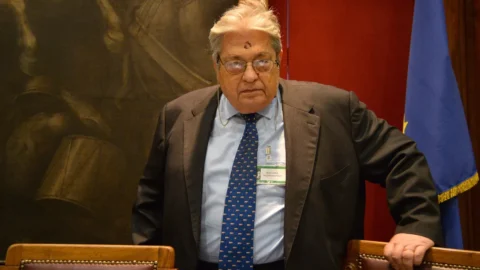Why are public administration creditors not paid? Why are the Emilian companies that suffered damage in last year's earthquake unable to obtain public grants? Why in L'Aquila, three years after the earthquake, has reconstruction not yet begun?
Because information on payments owed by public administrations is dispersed, fragmented and disorganized and even when it is decided to pay at least part of the overdue debts, as required by decree law no. 35 of 2013, it is not known who to pay, with what priorities and how much.
Because even when earthquake victims are expected to be entitled to public contributions, the administrative procedure is very complicated and takes a lot of time, which companies do not have: if they don't resume production as soon as possible, without waiting for bureaucracy, they go bankrupt and have to fire.
Because the reconstruction of a city like L'Aquila requires a coordinated assumption of responsibility among many different administrations, and each works, instead, on its own, often trying more to avoid responsibility than to solve the problem.
Politics is partly complicit and partly victim of this situation. Complicit, because it is frequently more interested in choosing trusted people than competent managers and in multiplying legislative announcements, without then worrying about the implementation of the rules. Victim, because bureaucrats, on the other hand, are induced to cultivate a relationship of trust rather than exercising their skills and emphasizing their role, expanding administrative regulation.
Thus, the multiplication of regulations, decrees, circulars, opinions and administrative acts is added to the legislative confusion. With these acts, however, nothing is decided, but we continue to provide interpretations of the rules and, often, to introduce new obligations for citizens and businesses.
A paradoxical example of this trend is provided by the so-called simplification measures. These often consist in leaving the task of interpreting the rules, verifying the existence of the requisites and certifying them to the citizen or company (as in the cases of tacit consent, Dia and Scia). In the face of this effort, the administration can remain silent and inert, and in this case the activity is considered authorized and can therefore begin. Uncertainty is, however, always imminent, because the administration can verify at any time the existence of the requisites and, if its interpretation differs from that of the person who made the request, the activity can be suspended or even permanently blocked .
For citizens and businesses it would certainly be more advantageous to have a prior decision by the administration, which would be a certainty that self-certification is not always able to guarantee. Since, however, the Italian administration uses the time as it wishes and it has never been possible to enforce the terms, an expedient is resorted to - silent consent and tacit authorizations - which unload on the applicant both the task of the investigation, and the risk of the subsequent check.
The problem is not only and so much of allowing action to be taken in the face of an inert administration, but of having an administration capable of taking decisions in a timely and technically reliable manner. This is all the more true for decisions on complex issues: the construction of a public work, a production plant, an infrastructure.
The central question is not, then, whether one or the other should prevail in the relationship between politics and administration, but rather the quality of both politics and administration (a capable minister, as F. Cavazzuti recalled in this site, can hardly be hindered by its managers).
The quality of administration would require a multiplicity of measures, on different levels. To give just a few examples: a recruitment based on merit, a rational and non-fragmented assignment of functions, a restructuring of decision-making processes and also, last but not least, a profound rethinking of the controls - administrative, accounting, criminal - which often operate as real disincentives to taking responsibility and choosing innovative solutions. It is no coincidence that the construction of administrative capacity – capacity building, in the Community jargon – is among the essential purposes foreseen for the use of the structural funds: a territory cannot develop without competent administrations capable of deciding and acting.
In addition to the, so to speak, internal side, measures can be introduced that operate on the external side of the relationship between administration and citizens. The administration should, for example, share its knowledge and interpretation of the rules from the outset, clearly indicating on its websites what can and can't be done, how requests should be prepared, which requests can be accepted and which ones are not, and why. Also during the procedure, the administration should not limit itself to pointing out deficiencies or obstacles, but indicate to the citizen how the difficulties can be overcome and how the result can be achieved. As R. Cass Sunstein has shown in the book (Simpler: The Future of Government, Simon & Schuster, 2013) in which he recounts his experience at the Oira during the first Obama presidency, the administration must not limit itself to publishing the rules, but concretely demonstrate how they can and must be applied: because the administration is at the service of the community and not vice versa.
As for the quality of politics… Spes ultima dea.
Su POLITICS and BUREAUCRACY recently spoke on FIRSTonline:
Giulio SAPELLI (8 May), Frank LOCATELLI (9 May), Bruno TABACCI (11 May), Linda LANZILLOTTA (14 May) e Philip Cavazzuti (22 May).





